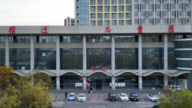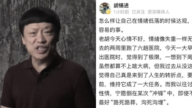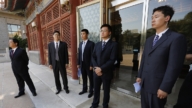【新唐人2012年4月10日讯】离中共十八大举行不到半年时间,随着省级领导班子相继换届,中国多地省级公检法司的“四长”也发生了变动。评论员解读,这一异动将削弱周永康对各地政法委的控制。同时国内民众在论坛上表示,领导变动换汤不换药,只不过是中共的官员“轮番致富”而已。
法制网4月5号报导,全国目前已经有十八位省级高级人民法院院长、人民检察院检察长、公安厅(局)长、司法厅(局)长发生了变动,多数为异地任职。其中包括新任的重庆市公安局局长何挺。
从省级公检法司“四长”履新一览表可以看到,除了何挺从青岛转任重庆后,新任职务一栏中写着“市委政法委副书记”以外,其余杨克勤、严植婵、王海萍等人,之前虽然担任政法委相关职务,但在调任异地后,都没有分派政法委工作。也就是说,十八位“四长”履新之后,还担任着政法委相关头衔的,就只有江泽民的侄女婿何挺一人。
三月底,中央政法委副书记王乐泉,通过全国政法委书记首期培训班结业式上的讲话站队,表忠胡锦涛,被舆论认为试图与周永康切割的表态。同时香港《动向》杂志也披露,中共公检法三巨头公安部长孟建柱、最高法院院长王胜俊、最高检察院检察长曹建明与上司--政法委书记周永康长期内讧,三人先后提交过辞职信。目前各地省级公检法司领导大变动,异地任职,是否意味着政法委这一组织将被削弱,江派人马进一步面临清洗呢?
时事评论员杰森指出,这一做法很可能是用来削弱周永康对各地政法委的控制。
杰森:“现在它突然意识到,因为政法委它实际上他控制着这个国家暴力机器的部门,就像军队那样的概念。这样实际上说呢把政法委人员也就看上去军区司令员的状态,它也不希望各个地方公检法对一个人的效忠超过对中共党组织的效忠,这样的情况下就是模仿军队司令员的对调来搞这种政法委这种对调。”
政法委可以控制中国的公安、法院、检察院、国安、武装警察系统,能随时调动中国外交、教育、司法、国务院、军队、卫生等资源。1999年7月,中共为了镇压法轮功而成立的“610办公室”与“政法委员会”合署办公;同时,还有“维护稳定工作领导小组”办公室也与“政法委员会”合署办公。之后“政法委”在镇压法轮功和打压各地民众抗暴中,耗掉的维稳经费远超过军费,成为另一个中央权力中心,与胡温存在不可调和的权力冲突。
杰森指出,“政法委”的存在破坏了中国的司法独立,司法机构根本无力监督“政法委”践踏法律。
杰森:“法院、检察院和公安人员实际上应该是有一个权力界限、权力互相制衡的过程,但是因为现在它上面统一汇报给一个机构就是政法委,都得按政法委的思维方式去运作,那么它们中间权力制衡司法独立的因素就彻底的荡然无存了,因为它们都是一个思想。”
而在国内,天涯论坛,中华论坛等网站上,网友们对这一轮省级公检法司“四长”履新后能否铲除司法腐败,重申冤假错案几乎全部表示了负面看法。网友(12345678清风)说,“肥鸭子下去了,又一波瘦鸭子上来了,轮番致富吧”; 另一网友( 永不翻案 )说,“这个体制不变,再换也是换汤不换药,旧贪下去,新贪上来。当官为什么?就是为钱!从上至下,从大到小,莫不如此!不要抱幻想!”
采访/易如 编辑/尚燕 后制/柏妮
Big Changes to High Ranked Provincial, Public Security and Court Officials
It is less than six months until the 18th CCP Congress.
Provincial leaders and the “four heads” of provincial public
security have just been changed.
Commentators think this will weaken Zhou Yongkang’s
control of power for the Politics and Law Committee.
Mainland netizens discussed in forums that leadership
changes only by name.
These changes just allow CCP officials
to take turns to get wealthy.
‘Legal Network’ reported on April 5 that 18 heads
of provincial public security got replaced recently.
This included Higher People’s Court president, Procurators,
Public Security Bureau (PSB) Chiefs and Justice Ministers.
Most of them work in a new province now, including He Ting,
the new PSB Chief in Chongqing.
As seen in the job change list of “four heads” in provincial
public security, He Ting was transferred from Qinghai.
He received a new position in Chongqing, as “Deputy
Secretary of the Politics and Law Committee.”
However, others on the list did not get receive such titles,
such as Yang Keqin, Yan Zhichan and Wang Haiping.
He Ting was the only person on the list to get a position
in the Politics and Law Committee.
He Ting is the husband of Jiang Zemin’s niece.
At the end of March, Wang Lequan, Deputy Secretary
of CCP Central Political and Law Committee, declared
allegiance to Hu Jintao in a closing speech at the National
Politics and Law Committee Secretary’s first training course.
The speech was seen as a gesture to disassociate himself
with Zhou Yongkang.
At the same time, Hong Kong “Trend” magazine disclosed
information about the ‘Big Three’ in CCP public security.
Meng Jianzhu, Public Security Minister, Wang Shengjun,
President of the Supreme Court, and Cao Jianming,
Attorney-General of Supreme People’s Procuratorate.
The report said that they had not worked well with their boss
Zhou for a long time, and submitted a resignation letter.
Along with leadership changes in provincial public security,
does this approach mean the Political and Law Committee
is weaken and Jiang faction is facing ‘further cleansing’?
A commentator named Jie Sen pointed out that this approach
is likely to be used to weaken Zhou’s control of the Political and Law Committee.
Jie Sen: “Now it is known that the Politics and Law
Committee actually controls the machine department of state violence, like the army.
Political and Law Committee staffs are also Military Region
Commanders.
So this approach to change positions just imitated
the method of swapping military commanders to prohibit
local public security being over loyal to one person,
and instead maintain loyalty to the CCP. ”
Politics and Law Committee controls public security, courts,
procuratorate, national security, as well as the armed police system in China.
It is able to use diplomacy, education, justice, the State
Council, the military, health system and other resources.
In July 1999, the “610 Office” was set up by the CCP for
the repression of Falun Gong.
The “Politics and Law Committee” and “610 Office” work
under one roof.
The “Leading Group Office of Maintaining Stability” and
“Politics and Law Committee” also work under one roof.
Funds for maintaining stability consumed by the Politics
and Law Committee far outweigh the military budget
as the persecution of Falun Gong, and people throughout
China has escalated.
Politics and Law Committee became another power center,
which had irreconcilable power conflicts with Hu-Wen.
Jie Sen pointed out that the existence of the Politics and Law
Committee destroyed judicial independence in China.
The judiciary departments cannot prohibit the Political
and Law Committee from trampling on the law.
Jie Sen: “There should be a line of authority among courts,
procuratorate and public security for balancing power.
However, all these departments now have to report to the
Politics and Law Committee and work under its command.
Therefore, the power balance factor among these
departments disappear; they have the same mind.”
On Chinese websites, such as Tianya Forum and China
Forum, users reacted negatively to the job change of “four heads” in provincial public security.
They do not believe these changes can eradicate
corruption in the judicial system. It reaffirms miscarriages of justice.
User ‘12345678 qingfeng’ said, “Fat ducks get down,
and a wave of thin ducks turns up and gets rich.”
Another user ‘yong bu fan an’ said, “The system cannot be
changed with a new name.
Old corrupt officials go, new corrupt officials come.
For what? Money! They are all for money.
From top to bottom, big to small of the CCP.
Do not have a fantasy!”



























